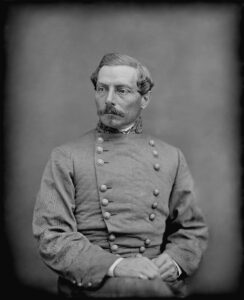Brigadier General Pierre Gustave Toutant de Beauregard, of the Army of the Confederate States, commanding the South Carolina Militia (citizen-volunteers) begins a 34-hour bombardment of Fort Sumter.
Postscript: Major Robert Anderson, of the Army of the united States, commander of Fort Sumter surrendered the next day.
[restored 1/26/2025]
The Hartford (Connecticut) Daily Commercial, editorializing on the apparently completed secessionist movement argues,
Public opinion in the North seems to be gradually settling down in favor of the recognition of the new Confederacy by the [f]ederal [g]overnment. The thought of a bloody and protracted … war, except as a matter of absolute necessity, is Abhorrent to all, and its issues may be as perilous to the victors as to the vanquished. To subjugate the seceded States by force of arms and compel them to remain in the Union, if it be possible, must involve great expenditure of treasure and life, and can result only in changing the present alienation into deadly hostility and incurable hats. If they remain in the Union, they must do so as peers of the other States, and not as conquered [p]rovinces. (Emphasis in the original)
[updated 1/26/2025]
Subsequent Events:
Authority:
Article I of Amendment
ccc-2point0.com/constitution-for-the-united-states
References:
Bruce Catton, The Civil War, (New York: American Heritage, 1960; Boston: Houghton-Mifflin, 1987), 284.
Thomas J. DiLorenzo, “Yankee Confederates, New England Secession Movements,” Secession, State and Liberty, David Gordon, ed., (New Brunswick, New Jersey and London: Transaction, 1998), 152.
The Daily Dispatch: may 10, 1861., [Electronic resource], Some Righteous men left.
www.perseus.tufts.edu/hopper/text?doc=Perseus%3Atext%3A2006.05.0115%3Aarticle%3Dpos%3D37


